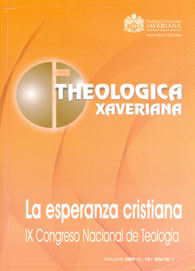Abstract
La situación de violencia y desesperanza que vive el mundo de hoy es innegable. Sin embargo, cada momento o situación está acompañada por la presencia de Dios, por su actuar amoroso: para poder vislumbrar esa presencia en el diario vivir, hay que disponer de oído para escuchar, despertar para ver, como lo hacían los profetas de Israel (Is. 51, 1.4.7). En esta situación, se reflexionará acerca de algunos textos que dan elementos para la consolación y el dolor. Una espiritualidad de la esperanza exige el ejercicio de una tarea profética que es ejercicio de pasión, compasión
por el pueblo; se trata de practicar la justicia y vivir el amor solidario como lo hizo el grupo de Israel y posteriormente Jesús, nuestro hermano mayor.
CAVALCANTI, T.P., “A sabedoria que vem da simplicidade: espiritualidade do
cotidiano- Livros Sapienciais”, en VVAA, Cebs: Espiritualidade libertadora,
Lutador, Belo Horizonte, 2004.
GUTIÉRREZ, G., Beber no próprio poço, Lima, 1989.
MARQUES, M.A., NAKANOSE, S., Sonhar de nuevo, Segundo e terceiro Isaías, (40-66), Paulus, São Paulo, 2004.
MCFAGUE, S., Modelos de Dios. Una teología para una era nuclear, Paulinas,
Sión Paulo, 1992.
MESTERS, C., OROFINO, F., VAONA, D., Revelar a ternura de Dios, CEBI, 2004.
SCHMIDT, W.H., Introduçãon ao Antigo Testamento, Sinodal, IEPG, São Leopoldo, 1994.
SOBRINO, J., Liberación con Espíritu, Sal Terrae, Santander, 1989.
TAMEZ, E., (ed), El mundo que las mujeres soñamos, DEI, Costa Rica, 1999a.
TAMEZ, E., Cuando los horizontes se cierran, DEI, Costa Rica, 1999.
VON RAD, G., Teologia do Antigo Testamento, ASTE, São Paulo, 1974.
WEINDRICH, H., “Teología narrativa”, en Conciliun 85, 1973; METZ, J.B., “Breve antologia da narratividade”, en Conciliun 85, 1973; BRAVO, C., “Narración. El Espíritu toma la Palabra”, en Christus 12, 1985; MORA LOMELI, R.H., “Cuando las abuelas contaban cuentos”, en Christus 12.
This journal is registered under a Creative Commons Attribution 4.0 International Public License. Thus, this work may be reproduced, distributed, and publicly shared in digital format, as long as the names of the authors and Pontificia Universidad Javeriana are acknowledged. Others are allowed to quote, adapt, transform, auto-archive, republish, and create based on this material, for any purpose (even commercial ones), provided the authorship is duly acknowledged, a link to the original work is provided, and it is specified if changes have been made. Pontificia Universidad Javeriana does not hold the rights of published works and the authors are solely responsible for the contents of their works; they keep the moral, intellectual, privacy, and publicity rights.
Approving the intervention of the work (review, copy-editing, translation, layout) and the following outreach, are granted through an use license and not through an assignment of rights. This means the journal and Pontificia Universidad Javeriana cannot be held responsible for any ethical malpractice by the authors. As a consequence of the protection granted by the use license, the journal is not required to publish recantations or modify information already published, unless the errata stems from the editorial management process. Publishing contents in this journal does not generate royalties for contributors.


